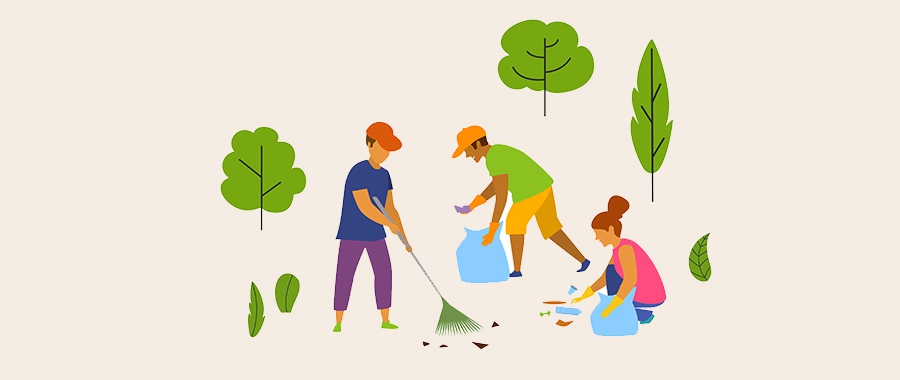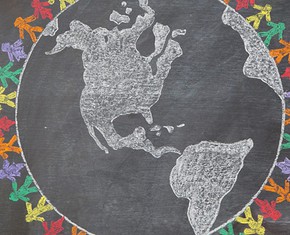The views expressed in our content reflect individual perspectives and do not represent the authoritative views of the Baha'i Faith.
We hear a lot about “the good old days”—back when everyone knew their neighbors and children roamed the streets freely.
Back then, people say, we had a culture of community—everyone looked out for each other, everyone had a neighborly, extended family beyond their home.
But today, things are different. Children have more opportunities, so kids spend after-school time in extracurricular activities. Neighborhood doors are carefully locked—in fact, neighbors may not even know each other. Family entertainment is more inward-facing, and a pervasive social anxiety only seems to be spreading as a result.
So—can we find a way to enjoy the modern era, while bringing back a culture of friendly, trusting community living? Or are we destined to see the downfall of the community life our parents remember?
The Baha’i teachings urge us all to find new ways to associate with each other:
Some of the creatures of existence can live solitary and alone. A tree, for instance, may live without the assistance and cooperation of other trees. Some animals are isolated and lead a separate existence away from their kind. But this is impossible for man. In his life and being cooperation and association are essential. Through association and meeting we find happiness and development, individual and collective. – Abdu’l-Baha, The Promulgation of Universal Peace, p. 35.
As humans, our happiness depends on our relationships with others. So it’s only natural that the breakdown in community life in many parts of the Western world brings with it a sense of profound isolation—not only physical or emotional, but also spiritual. No matter how great our education, how clear our understanding, how comfortable our lives, a lack of a thriving community life—of developing that collective identity in a central location—cripples us as a society.
Some time ago, I participated in an interesting effort with some friends in a large city. Our goal: to go out to the street and try to have as many meaningful conversations as we could with people in the neighborhood.
What struck us all was not only the number of people eager to have a meaningful, sometimes profoundly personal conversation after just meeting us, but also all the people who said something along the lines of “It’s so nice that you guys are doing this. No one in this neighborhood ever wants to talk to anyone else. I wish my neighbors were like this.”
Ironically, more than half of the people we spoke to said the same thing, not knowing that their neighbors shared those feelings.
So what makes us so afraid of reaching out? Somehow, isolation became the norm in “advanced” societies. Perhaps those isolated lives seem safer or more comfortable. Perhaps our concept of spiritual and emotional health centers today on the individual and not the bonds between people.
In conversation some time ago, a friend of mine who is a Syrian refugee revealed something profound that he had learned while living in the wilderness, going through life-threatening situations, and sleeping on the streets in his search for a new country to live in. “After being through all that,” he told me, “I can see anyone and love them. I see a man sleeping on the street, and I know he is my brother—because I have been in his situation, too.”
Perhaps if we were to adopt this kind of empathic collective identity—the kind that hearkens back to our ancestors, who shared meals, faced challenges together, raised their children communally—we would no longer ignore the problems around us, but would instead feel moved to fix them together:
The supreme need of humanity is cooperation and reciprocity. The stronger the ties of fellowship and solidarity amongst men, the greater will be the power of constructiveness and accomplishment in all the planes of human activity. – Ibid.
Community life can turn a challenge into something we face together, and make our personal growth an effort we undertake for the sake of those around us. When those things occur, progress and unity happen. With unity, everything becomes possible.
It might be hard to imagine what this type of community life would look like in the place where we live. But we do have guidance and experience. We know how to nurture relationships with close friends or family members—now we only have to expand that practice until it embraces everyone.
Of course, it’s easy to say “love everyone,” but what does that really mean? Do we really think of our neighbors as our best friends, invite them into our lives as we would a person we love? Are we willing to put aside suspicion, fear, or even complacency and laziness to plant the seeds of a collective future where “modern society” becomes synonymous with love, friendship and spiritual prosperity? If so, what are the concrete steps we will take towards making that unity a lived reality?
The Baha’i teachings give us clear instructions and a vision of a united world, which starts from our own communities:
See ye no strangers; rather see all men as friends, for love and unity come hard when ye fix your gaze on otherness. And in this new and wondrous age, the Holy Writings say that we must be at one with every people; that we must see neither harshness nor injustice, neither malevolence, nor hostility, nor hate, but rather turn our eyes toward the heaven of ancient glory. For each of the creatures is a sign of God, and it was by the grace of the Lord and His power that each did step into the world; therefore they are not strangers, but in the family; not aliens, but friends, and to be treated as such. – Abdu’l-Baha, Selections from the Writings of Abdu’l-Baha, p. 24.
You May Also Like
Comments

















See ye no strangers;" starts with "ye" :) many "ye-s" together make up a communit-ye